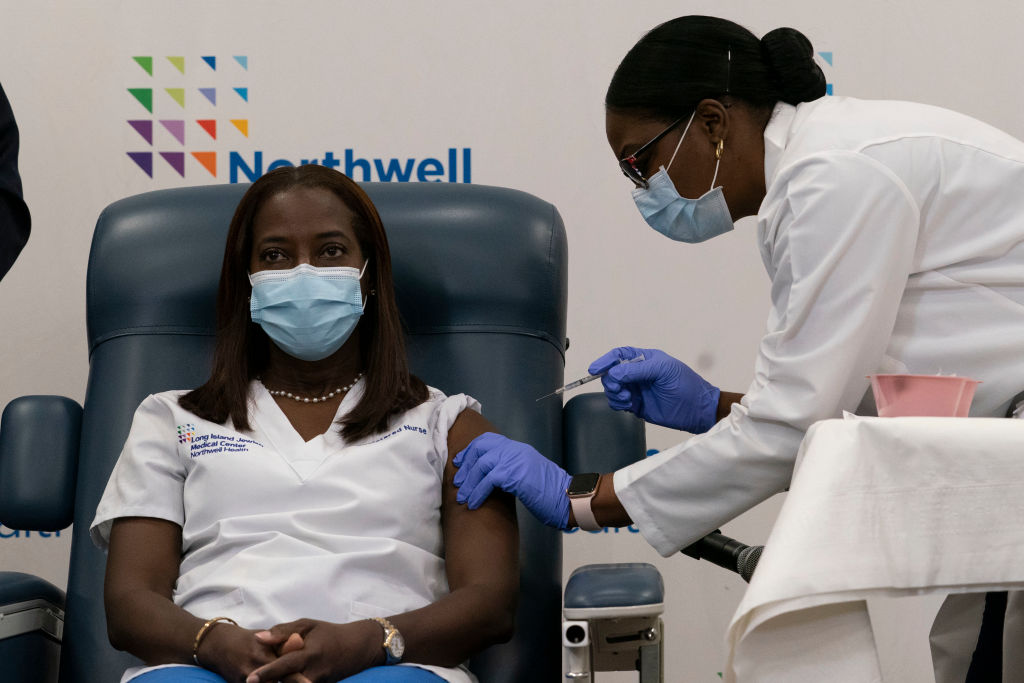Nurse who received 1st COVID-19 vaccine in U.S. feels 'huge sense of relief,' asks people to 'believe in science'


A free daily email with the biggest news stories of the day – and the best features from TheWeek.com
You are now subscribed
Your newsletter sign-up was successful
The first person to receive the coronavirus vaccine in the U.S. inoculation campaign, intensive care unit nurse Sandra Lindsay, said she feels "a huge sense of relief" and "hope for everyone around the world that healing is coming, that we took a step in the right direction to finally put an end to this COVID-19 pandemic."
Lindsay works at Long Island Jewish Medical Center in Queens, and she was witness to the suffering of many New Yorkers when the city was the coronavirus epicenter in the spring. She agreed to receive the vaccine on television in order to instill public confidence that it is safe, she told MSNBC's Joy Reid on Monday afternoon, adding that treating so many coronavirus patients led to "very dark" days.
"I had to be numb to be able to push through and support my staff as they worked tirelessly," she added. "They made tremendous sacrifices to be on the front lines and I just wanted to make sure I was right there with them, to support them, to give them everything they needed to carry on this fight and to save as many lives as they could."
The Week
Escape your echo chamber. Get the facts behind the news, plus analysis from multiple perspectives.

Sign up for The Week's Free Newsletters
From our morning news briefing to a weekly Good News Newsletter, get the best of The Week delivered directly to your inbox.
From our morning news briefing to a weekly Good News Newsletter, get the best of The Week delivered directly to your inbox.
Due to historical mistreatment and a lack of trust in the medical system, there is skepticism in the Black community about the vaccine. Lindsay, an immigrant from Jamaica, said she understands their concerns, but "as a nurse, my practice is guided by science. I believe in science. What you should not trust is COVID-19. You don't know how it will affect you."
She encouraged people to continue to wear masks, practice social distancing, wash their hands, and avoid gatherings, telling Reid she is "just tired of seeing the hurt, the pain, the suffering, and the deaths. That is why it was really important for me to take the vaccine and do my part to put an end to this pandemic."
A free daily email with the biggest news stories of the day – and the best features from TheWeek.com
Catherine Garcia has worked as a senior writer at The Week since 2014. Her writing and reporting have appeared in Entertainment Weekly, The New York Times, Wirecutter, NBC News and "The Book of Jezebel," among others. She's a graduate of the University of Redlands and the Columbia University Graduate School of Journalism.
-
 ‘Those rights don’t exist to protect criminals’
‘Those rights don’t exist to protect criminals’Instant Opinion Opinion, comment and editorials of the day
-
 Key Bangladesh election returns old guard to power
Key Bangladesh election returns old guard to powerSpeed Read The Bangladesh Nationalist Party claimed a decisive victory
-
 Judge blocks Hegseth from punishing Kelly over video
Judge blocks Hegseth from punishing Kelly over videoSpeed Read Defense Secretary Pete Hegseth pushed for the senator to be demoted over a video in which he reminds military officials they should refuse illegal orders
-
 Trump HHS slashes advised child vaccinations
Trump HHS slashes advised child vaccinationsSpeed Read In a widely condemned move, the CDC will now recommend that children get vaccinated against 11 communicable diseases, not 17
-
 FDA OKs generic abortion pill, riling the right
FDA OKs generic abortion pill, riling the rightSpeed Read The drug in question is a generic version of mifepristone, used to carry out two-thirds of US abortions
-
 RFK Jr. vaccine panel advises restricting MMRV shot
RFK Jr. vaccine panel advises restricting MMRV shotSpeed Read The committee voted to restrict access to a childhood vaccine against chickenpox
-
 Texas declares end to measles outbreak
Texas declares end to measles outbreakSpeed Read The vaccine-preventable disease is still spreading in neighboring states, Mexico and Canada
-
 RFK Jr. shuts down mRNA vaccine funding at agency
RFK Jr. shuts down mRNA vaccine funding at agencySpeed Read The decision canceled or modified 22 projects, primarily for work on vaccines and therapeutics for respiratory viruses
-
 Measles cases surge to 33-year high
Measles cases surge to 33-year highSpeed Read The infection was declared eliminated from the US in 2000 but has seen a resurgence amid vaccine hesitancy
-
 Kennedy's vaccine panel signals skepticism, change
Kennedy's vaccine panel signals skepticism, changeSpeed Read RFK Jr.'s new vaccine advisory board intends to make changes to the decades-old US immunization system
-
 Kennedy ousts entire CDC vaccine advisory panel
Kennedy ousts entire CDC vaccine advisory panelspeed read Health Secretary RFK Jr. is a longtime anti-vaccine activist who has criticized the panel of experts
